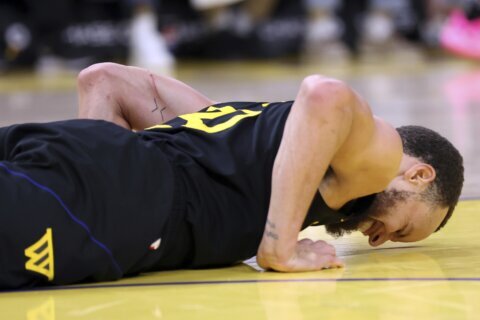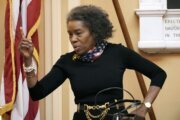ELKHART LAKE, Wis. (AP) — Mikayla Moore has been riding motorcycles since age 6 and started racing two years later, competing almost exclusively against males.
The 20-year-old Moore hadn’t been part of something quite like the series she’s hoping to win for a second straight year.
Moore is part of Royal Enfield’s Build. Train. Race. program, which is designed to teach women how to build and race their own motorcycles. The women selected to compete in this initiative are given a Royal Enfield Continental GT 650 twin that they convert into a racing bike they use throughout the season.
“To be here means so much,” Moore said.
The program has 13 women competing in the road racing division, which has held MotoAmerica races this year at Barber Motorsports Park in Birmingham, Alabama, and Road America at Elkhart Lake, Wisconsin. Its final two stops will be in Shelton, Washington, and the Mid-Ohio course in Lexington, Ohio.
“It seemed like female racing was underserved. There was a lot of demand and a lot of passionate individuals out there who had expressed interest in racing,” said Nathan Kolbe, the head of marketing for Royal Enfield in the Americas Region. “So we just kind of said, “OK, what would this look like?’“
The women were chosen from among 90 applicants by a group that included Freddie Spencer, a three-time world champion motorcycle racer. Spencer said his group interviewed the top 20 applicants before making the final cuts.
“There’s so many incredible stories and so many talented women riders,” Spencer said. “They’re inspiring. … The most difficult part is not finding riders. It’s selecting only the amount that we need.”
Ten other women are competing in the flat-track division, which has a different set of venues. The flat-track division enters its fifth season, while the road racing series enters its fourth year.
Most of the racers compete while also maintaining their day jobs.
Moore, who’s from Upper Marlboro, Maryland, works at her father’s motorcycle shop. Shea McGregor, who lives just outside the Twin Cities in Minnesota, designs drive trains and chassis for fire trucks when she isn’t racing. Kate West of Thorndike, Maine, works in a school with children facing social and emotional deficits.
Lucy Blondel, a veterinarian from Vancouver, says her time on a motorcycle “kind of almost relieves stress a lot of time from medicine, believe it or not.”
“I think I’m an adrenaline junkie,” Blondel said. “The adrenaline you get on a motorcycle is amazing. Just when you think you’ve got the hang of it, you don’t.”
There is no prize money at stake in these races, but sponsorships cover just about all the equipment and travel costs associated with competing. Before the season, the racers had five days to repurpose their motorcycles at Grapevine, Texas. The bikes are theirs to keep after the season.
The women have varying levels of racing experience, so they undergo training with Spencer and others after they get their motorcycles in racing shape. Three professional mechanics assist in repurposing their motorcycles and accompany each of the races. The competitors stay in the series for only one or two years.
“This is a stepping stone,” said Holly Varey of Brantford, Ontario. “(It’s) offering this opportunity for racers who may not be able to make it to MotoAmerica for financial reasons or whatever – certainly I couldn’t – and giving them a platform to perform and show off talent and hopefully get picked up by a pro team and continue that trajectory.”
The idea is to work their way up to some MotoAmerica circuits that offer prize money. MotoAmerica officials say five to eight women have competed across the various series each year since the organization started in 2015.
That list includes some riders with connections to the program Build. Train. Race.
Sonya Lloyd is a former BTR competitor who now is part of the MotoAmerica Twins Cup circuit. Moore competed in her first Twins Cup event at Road America this month.
While the Build. Train. Race. riders develop their skills in this series, they also benefit from the camaraderie that comes from being part of an all-woman initiative. They’re showcasing their competitiveness while also helping one another when they’re off the track.
“When the helmets go on, a racer’s a racer,” said Cassie Creer of Salt Lake City, who earned her first victory this month at Road America. “That’s the way I think about it. I love racing against all women because of the support in the paddock, and also we’re all doing something that’s a male-dominated sport. It’s something we’re all able to get together and do. But once the helmets go on and I’m on the grid, it doesn’t matter who’s there.”
It certainly matters to the young fans who gather around the racers before every event.
“All the little girls that we get coming through here, they look at us like, ‘We want to do that one day,’“ West said. “Pretty cool.”
___
AP motorsports: https://apnews.com/hub/auto-racing
Copyright © 2025 The Associated Press. All rights reserved. This material may not be published, broadcast, written or redistributed.









